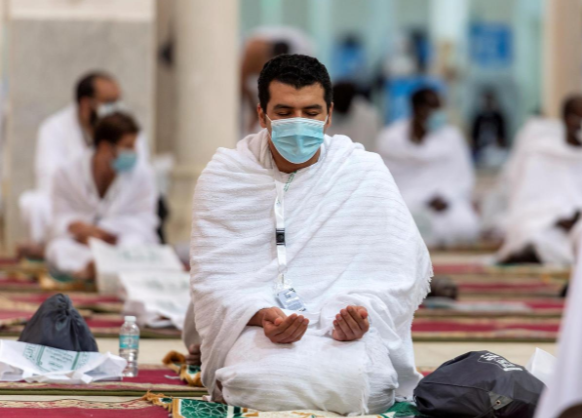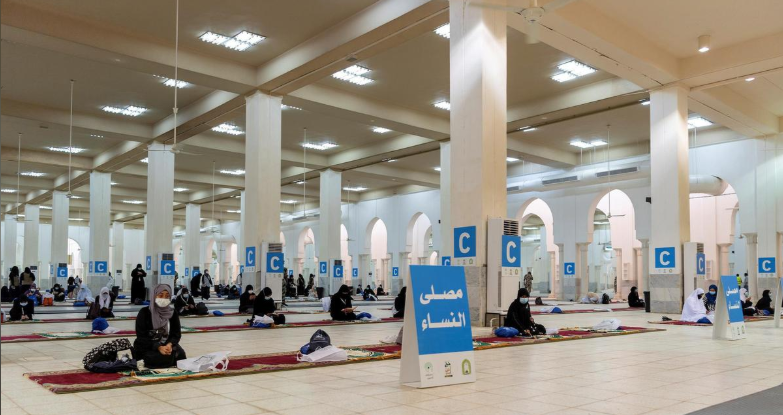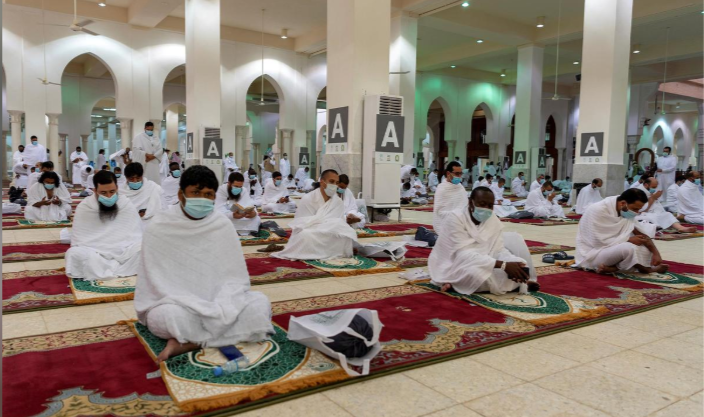RIYADH: In years before the coronavirus, some 3 million white-clad pilgrims from across the world flocked to Islam’s holiest sites to attend Hajj under Saudi Arabia’s blistering sun.
With the pandemic making large gatherings impossible, only a few thousand pilgrims — Saudis and foreign residents — are gathering this year on Mount Mercy on the plains of Arafat for the most important ritual. They share a common plea.

A Muslim pilgrum wearing a protective mask, prays inside Nimra Mosque in Arafat to mark Hajj's most important day, Day of Arafat, during his Hajj pilgrimage amid the coronavirus diease (COVID-19) pandemic, outside the holy city of Makkah, Saudi Arabia July 30, 2020. (SPA/ REUTERS)
“Everyone will be praying for this pandemic to end, and for all the people of the world to see better months to come after all the suffering caused by coronavirus,” said Ammar Khaled, a 29-year-old Indian pilgrim who is an IT professional in Jeddah.
Saudi Arabia stakes its reputation on its guardianship of Islam’s holiest sites in Makkah and Madina and its peaceful organization of Hajj.
Over the years, the kingdom has spent billions of dollars on making one of the world’s biggest religious gatherings more secure.
This year it faces the challenge of keeping Hajj, a once-in-a-lifetime duty for every able-bodied Muslim who can afford it and a major source of income for the government, safe from COVID-19.

Muslim pilgrims maintain social distancing as they pray inside Nimra mosque in Arafat to mark Hajj's most important day, Day of Arafat, during their Hajj pilgrimage amid the coronavirus disease (COVID-19) pandemic, outside the holy city of Makkah, Saudi Arabia July 30, 2020. (SPA/ REUTERS)
For the first time in modern history it has dramatically reduced the number of pilgrims to ensure social distancing measures are adhered to.
The Hajj minister said in June the number of pilgrims would be limited to around 1,000, but no official number has been given for those performing the rituals this week. Some local media cited a figure of some 10,000.
Saudi health care and security professionals, on the frontlines of the battle against the disease, make up about 30% of the total, with the remainder coming from 160 nationalities residing in the Kingdom.
Mask-wearing pilgrims circled the Kaaba — a structure that is the most sacred in Islam and the direction which Muslims face to pray — in small groups of 50 people, each keeping a safe distance apart and accompanied by a health professional monitoring their movements.
Unlike past years when they lunged toward the Kaaba, pilgrims are not allowed to touch the plain stone cube building covered in black cloth and wrapped in Arabic writing in golden silk.

Muslim pilgrims maintain social distancing as they pray inside Nimra mosque in Arafat to mark Hajj's most important day, Day of Arafat, during their Hajj pilgrimage amid the coronavirus disease (COVID-19) pandemic, outside the holy city of Makkah, Saudi Arabia July 30, 2020. (SPA/ REUTERS)
Workers sanitised the structure, rubbing Oud perfume, the popular Arab sweet and woody scent, on its walls and carrying incense as they moved around the premises of the Grand Mosque.
Pilgrims took several medical tests and were asked to quarantine for a week before starting their journey, then isolate for another week in their hotel rooms.
They were given an electronic bracelet to monitor their movements and a suitcase containing all basic necessities.
On site, 3,500 workers spread across the Grand Mosque in Makkah to sanitise it using 54,000 liters (11,888 gallons) of disinfectant and 1,050 liters of air fresheners daily.
The floors of the mosque were scrubbed 10 times a day, up from three times in the past.
Six hospitals were dedicated to serving pilgrims and 51 clinics and 200 ambulances were spread across different sites, with the support of 62 field teams and 8,000 health care professionals.
“The kingdom is relying on years of experience in managing the pilgrimage and has worked hard in collaboration with the WHO to ensure that the pilgrimage goes very smooth,” said Hanan Balkhy, assistant director-general of antimicrobial resistance at the World Health Organization.
With joy and tears, pilgrims spent the day on Mount Arafat, where the Prophet Muhammad gave his last sermon, raising hands in prayer to atone for their sins, their lips moving behind face masks.
This year each pilgrim received sanitised pebbles in advance of the event on Friday, the first day of Eid Al-Adha or the feast of sacrifice.

































